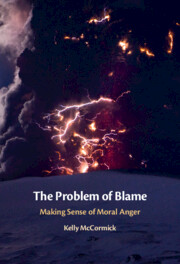Book contents
- The Problem of Blame
- The Problem of Blame
- Copyright page
- Dedication
- Contents
- Acknowledgments
- Introduction
- Part I The Permissibility of Blame
- Part II Prescriptive Preservationism and Eliminativism
- Chapter 5 The Methodological Burdens for Eliminativism
- Chapter 6 Free Will, Responsibility, and Reference
- Chapter 7 Facing the Dark Side
- References
- Index
Chapter 7 - Facing the Dark Side
from Part II - Prescriptive Preservationism and Eliminativism
Published online by Cambridge University Press: 21 April 2022
- The Problem of Blame
- The Problem of Blame
- Copyright page
- Dedication
- Contents
- Acknowledgments
- Introduction
- Part I The Permissibility of Blame
- Part II Prescriptive Preservationism and Eliminativism
- Chapter 5 The Methodological Burdens for Eliminativism
- Chapter 6 Free Will, Responsibility, and Reference
- Chapter 7 Facing the Dark Side
- References
- Index
Summary
While I take my arguments in earlier chapters to have diffused the force of worries about the harms of reactive blame, I anticipate that concerns about “the dark side” of free will, moral responsibility, and reactive blame will continue to linger. In this final chapter, I address them head-on. I examine two of the worst potential costs of free will, responsibility, and blame – their apparent connection with a constellation of deeply troubling political beliefs, and concerns about harming the innocent undeservedly. I argue that neither of these concerns can successfully motivate a brute pragmatic argument for eliminativism over preservationism. However, in the final section I sketch just this kind of argument in favor of preservationism. Here I conclude on a more personal note, by emphasizing my own victim-centered interests in theorizing about free will, responsibility, and blame, and suggest that when we adopt a perspective that places the testimony of actual victims at the forefront, eliminativism appears to have a dark side of its own. There is in fact an argument from empathy that ought to be considered more explicitly in our attempts to adjudicate between eliminativists and preservationists, and it counts heavily in favor of preservation.
- Type
- Chapter
- Information
- The Problem of BlameMaking Sense of Moral Anger, pp. 192 - 210Publisher: Cambridge University PressPrint publication year: 2022

